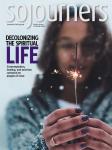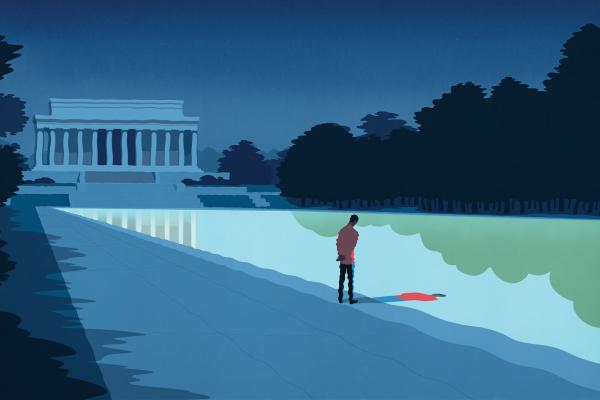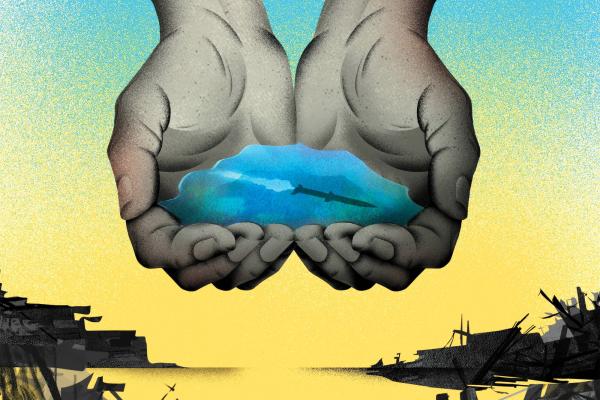Reynolds arrived at an early morning protest in St. Paul, Minn., a few hours after Philando’s death. I heard her tell her story to a small crowd gathered on the street. Weeping, she shared how impossibly stuck they felt in the 74 seconds between stopping their car for the police and Castile being shot multiple times.
Castile was never given a chance to show identification because he was shot as he reached for his wallet. He tried to tell the officer about his legally licensed handgun, but the screaming officer didn’t seem to hear.
As Castile, Reynolds, and her young child ran errands on that summer night, civil rights laws did not protect their “life, liberty, and pursuit of happiness.” The Civil Rights Act of 1964 allowed for Castile’s employment at an elementary school and made legal their right to move through town. But these rights were not enough to protect Castile’s freedom to live.
What is democracy?
As U.S. Christians and others fight to defend the space for justice created by civil rights movements of the past, another theme rises: What does freedom mean in America today? What does Reynold’s rage require of people of faith?
At a minimum, it requires moving beyond a Sunday school version of democracy, as Southern Freedom Movement leader and historian Vincent Harding put it in 2002. “A solution of the present crisis will not take place unless ... [we] work for it. Human progress is neither automatic nor inevitable ... Every step toward the goal of justice requires sacrifice, suffering, and struggle. ... This is no time for apathy or complacency. This is a time for vigorous and positive action,” Harding said, quoting Martin Luther King’s Stride Toward Freedom.
Words such as “democracy,” “justice,” and “rights for all” no longer mean what they used to. Brenda Salter McNeil, an Evangelical Covenant Church pastor in Seattle, wonders how to define democracy in the current context. “The entanglement of democracy with capitalism and nationalism makes it difficult to explore what democratic engagement means for Christ-followers today,” said Salter McNeil in a phone interview.
If it is not as simple as “liberty and justice for all,” what is it? Has American democracy ever existed according to its ideals? What is the role today of Christians in advancing American democracy toward the “goal of justice”? What kind of struggle, sacrifice, and action will be required?
Incomplete or misleading historical narratives, white supremacy, and political hypocrisies that undermine our nation’s stated values have led many to social resistance, insisting that America may only dare to call itself great when we realize a version of democracy that has not yet existed. Harding, who died in 2014, called this future version of democracy “advanced” to indicate the mature, creative energy needed to grow our understanding and expand our skill set for the changing needs of society.
“Democracy is like any other living organism,” Harding said. “It either grows or it dies.” To him, spiritual depth and maturity make a healthy society possible and allow societies to transcend impulses that turn difference into division or difficulty into apathy. Ecological metaphors are a reminder that democracy is not static and point to qualities such as interdependence, humility, patience, resiliency, and beauty. Harding championed these qualities as he elevated discourse around democratic engagement.
Avoiding 'ugly partisanship'
However, for some Christians the first question is whether to engage at all.
Greg Boyd, founder of Woodland Hills, a nondenominational megachurch in St. Paul, took up this fundamental question in his book The Myth of a Christian Nation. Fed up with pressure he received to influence his congregation toward certain candidates and political platforms during the 2004 campaign season, Boyd developed a thesis that shapes his view of civic engagement today. “I think it is important that Christ-followers remember that our unique focus is to advance God’s kingdom, not nurture democracy,” Boyd said.
Does it have to be either God’s kingdom or democratic engagement? “The ideals of our democratic society overlap at significant points with our kingdom calling, meaning that the church can (carefully) forge partnerships with governmental agencies to accomplish tasks we all want to see accomplished, including working to bring ‘liberty and justice for all,’” said Boyd. His caution stems from fear that Christians can too easily be sucked into ugly partisanship, cede spiritual power, and lose an ability to bear witness to the revolutionary message of the gospel.
Harding’s antenna was particularly attuned to fear, which he believed comes in many disguises and has tenacious roots. For Christians committed to thoughtful, advanced, democratic engagement, Harding’s voice echoes others who invite us into the gritty, redemptive, and deeply spiritual work of shaping a democratic society that works better for more people.
Salter McNeil sees fear at the root of attitudes that undermine our ability to connect as humans. Fears “nourish a scarcity mindset that leads to building walls,” she said. If, as Harding put it, the meaning of democracy is about “encouraging the capacities that are in us all to create living space, breathing space, acting space, and growing space for each other,” then naming our fears is a prerequisite to building a version of U.S. democracy rooted in values that nurture rather than destroy.
Hospitality in the flesh
When the oldest Somali mosque in Minnesota burned to the ground in 2014, neighboring Trinity Lutheran Congregation decided to invite the Dar Al-Hijrah community to use Trinity’s building for meetings and office space. Proximity made this arrangement work, but hospitality made it possible. Proximity and hospitality often go hand in hand with advanced-democracy practices. Harding once said, “Let us hear [our neighbors], so we may not answer unasked questions, love unreal persons, or bear witness to an unknown world.”
Harding marveled at the possibilities generated by human connection and imagination. “It is now that we may be able to convey the stunning idea that dreams, imagination, vision, and hope are actually powerful mechanisms in the creation of new realities—especially when the dreams go beyond speeches and songs to become embodied—to take on flesh, in real, hard places,” he said.
Binding the strong man
Harding used freedom language to describe what he and others were doing in the 1950s and 1960s—he had an aversion to describing their goal of social transformation as a “civil rights” movement. He chose to associate their vision with concepts of expansiveness, humility, and collaboration. Freedom is internally defined and externally affirmed. It is interdependent, ongoing, and best realized within relationships of equitably shared power. Rights, on the other hand, are granted (or not) by an external authority, making them possible only within a hierarchy of power. Rights are static, nonrelational, and externally imposed.
Civil rights are essential, but they do not guarantee Americans’ ability to be free. On the other hand, extreme individualism and extreme personal rights fuel division, as Harding warned, and undermine democracy. This direction leads to assuming that life is a zero-sum game between “us” and “them,” categories Christians have often perpetuated and reinforced.
Michael McBride, a public theologian, activist, and pastor in the Bay Area, suggests that “Any reach for power should be through stewardship, seeing ourselves as stewards of the world and democracy on behalf of our Creator.”
Christians should “show up as a compassionate presence” in our democracy, said McBride, and take the lead in a “radical reimagination of peacemaking.” He believes this new imagination would include an honest assessment of economic, political, and law enforcement structures to gauge how well they are working for a broad range of Americans, especially poor people of color. McBride challenges the church to lead others to “see the world as it should be,” not as it is.
Before offering a creative road forward, the church must lament and repent over complicity and perpetuation of white supremacy, which McBride considers the “strong man” of the American experience. Jesus says that the “strong man” must first be bound before his possessions can be taken, or before we can access the God-given potential of the world for redemption and freedom (Matthew 12). If the strong man is not bound, the promise of those under his control will never be realized. Jesus’ life, death, and resurrection embodied and exemplified the kind of power needed to bind anything that gets in the way of the abundant life designed for all of creation. Jesus’ power was sacrificial, tenacious, humble, creative, determined, and fed not by ego or fear but by complete trust in God’s will and love.
To what degree are U.S. Christians tapping into that kind of power today?
For the sake of Philando Castile, Diamond Reynolds, and thousands of others, American Christians must move beyond Sunday school democracy to a more advanced version. Leaders in the Southern Freedom Movement were accused of naiveté, even weakness, for advocating this kind of power as the way to turn human hearts toward loving community. Today, louder, more fearful voices have drowned them out, making the church and democracy nearly unrecognizable.

Got something to say about what you're reading? We value your feedback!




